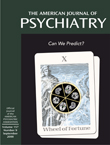To the Editor:
There has recently been an increase in the number of reports focusing on pediatric bipolarity. An issue of current debate is whether there are presentations of this condition that are unique to youths
(1). The retrospective life charting method
(2) has been used to describe the longitudinal history of bipolar disorder in adults. We are not aware of any published cases that have utilized this technique in children.
We gave the retrospective life charts to parents of youngsters seen at our institution who met the DSM-IV criteria for bipolar disorder type I to assess the longitudinal course of pediatric bipolarity. Specifically, we wished to ascertain whether pediatric bipolar disorder is a cyclic condition. These procedures were approved by the institutional review board of the University Hospitals of Cleveland. All guardians provided written informed consent, and all patients provided assent before participation.
The parents of 10 outpatients who met the full DSM-IV criteria for a lifetime diagnosis of bipolar disorder type I were instructed on how to complete retrospective life charts, and the parents of each child were given a life chart to complete for their child. These patients’ mean age was 12.1 years (range=8–17). Six of these youths were boys. Through the retrospective life charts, the parents of each child described a cyclic, biphasic course in which periods of both mania and depression were present. Seven youths experienced rapid cycling.
In the year before assessment, eight patients had continuous cycling. During this time, the mood episodes were too numerous to count in three of these children. The seven other patients had an average of 2.1 episodes of depressed mood, which lasted an average of 2.9 months. These seven youths also had an average of 2.7 episodes of elated mood, with a mean length of 3.6 months. When we used the life charting method’s severity scale of 0–4, in which a score of 0 indicates no dysfunction and a score of 4 indicates severe dysfunction, the mean severity of the elevated moods was 1.7, and the mean severity of the depressed moods was 1.4. Both of these scores indicate mild to low-moderate symptom severity. It is likely that these last results reflected the fact that some of the children were receiving treatment before their assessment.
Overall, these results suggest that children who meet the DSM-IV criteria for bipolar disorder type I indeed do have a cyclic, biphasic disorder that is associated with high rates of rapid and continuous cycling. These findings also suggest that the life charting method may be a useful tool in studying the longitudinal course of children and adolescents with bipolar disorder.

